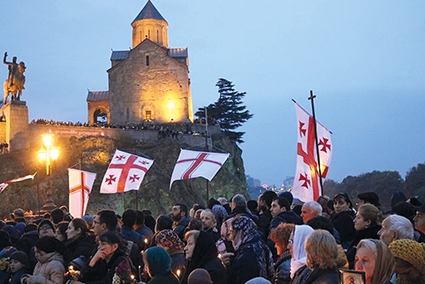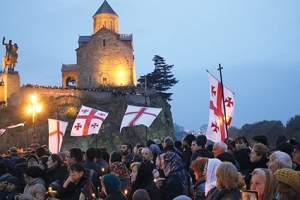Pew Research Center: Religion & Georgia
The Pew Research Center report about religion, minorities and key social issues, shows that the views of Eastern and Western Europeans differ over some very important issues.
The Pew Research Center conducted surveys between 2015 and 2017 among nearly 56,000 adults (aged 18+) in 34 Western, Central and Eastern European countries, including Georgia.
The research shows that 99% of Georgians believe in God, which is the highest indicator in Europe. 73% stated they believe in God and are absolutely certain about it, while 24% have the belief but are uncertain. Only 1% of Georgians responded that they do not believe in God.
In this list, Georgia is followed by Armenia, Moldova and Romania each at 95%.
As for the branches of the Christianity in Europe, according to the study, Orthodoxy is the dominant faith in the East, including in Greece, Russia, the former Soviet republics of Georgia, Moldova, Armenia, Ukraine and Belarus and other former Eastern bloc countries such as Serbia, Romania and Bulgaria. Catholic-majority countries are prevalent in the central and southwestern parts of Europe, cutting a swath from Lithuania through Poland, Slovakia and Hungary, and then extending westward across Croatia, Austria, Italy and France to the Iberian Peninsula. Protestantism is the dominant Christian tradition in much of Northern Europe, particularly Scandinavia.
89% of the interviewed Georgians stated they are Orthodox, while 1% are Catholics, 1% -Protestants and 9% representatives of other religious groups.
Fully half or more adults in Georgia, Greece, Bosnia, Armenia and Romania say religion is very important in their lives, compared with about one-in-ten in France, Germany, the United Kingdom and several other Western European countries. Similarly, roughly three-in-ten Slovaks, Greeks and Ukrainians say they pray daily, compared with 8% in Austria and Switzerland. Western Europeans also are more likely than their neighbors in the East to say they never pray.
50% of Georgians claimed that religion is very important in their lives and 39% out of them stated they attend the services at least once in a month. Meanwhile, 38% of the interviewed Georgians said they pray every single day.
In addition to belief in God, Central and Eastern Europeans are more likely than Western Europeans to express belief in fate (that the course of life is largely or wholly preordained), as well as in some phenomena not typically linked with Christianity, including the “evil eye”.
73% of Georgians say they believe in fate, while 52% believe in the “evil eye” and 11% in reincarnation.
Moreover, Europeans across the continent are largely united in support of a separation between religion and government. More than half of adults in most countries say religion should be kept separate from government policies, rather than the opposing view that government policies should support religious values and beliefs.
In seven Central and Eastern European countries, however, the view that church and state should be separate falls short of a majority position. This includes Armenia and Georgia – where the balance of opinion favors government support for religious values and beliefs – as well as Russia, where 42% of adults say the government should promote religion.
44% of Georgians say religion should be kept separate from the government policies, while 52% say the government should support religious beliefs and values.
By Thea Morrison
Photo source: orthochristian.com












